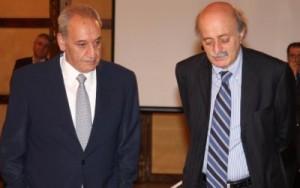 By Michael Young
By Michael Young
If there were doubts that the rivalry between Syria and Hizbullah has reached new levels of complication, then consider the recent statements by the Parliament speaker, Nabih Berri, and the Druze leader, Walid Jumblatt, on the Special Tribunal for Lebanon.
Berri and Jumblatt seemed to be reading from the same songbook when they declared recently (Jumblatt in his weekly Al-Anbaa editorial) that one had to distinguish between the work of the tribunal and any indictment it might issue. This was subtle, but not so subtle that the public failed to miss that both men were effectively rejecting the view expressed by Hizbullah’s secretary general, Sayyed Hassan Nasrallah, that the institution itself was an “Israeli project.”
In his speech on Tuesday commemorating the 32nd anniversary of Imam Musa al-Sadr’s disappearance, Berri avoided criticizing the tribunal, and took a number of political stances marking his distance from Hizbullah. He insisted that the “project of the state” was a Shiite interest, implicitly censuring Hizbullah’s efforts to undermine state authority; he affirmed that Lebanon “respected its engagements with regard to implementation of Resolution 1701” and emphasized the “close human relations between the inhabitants [of the south] and UNIFIL forces.” And he defended Taif as “our constitution,” repeating that its clauses on deconfessionalization awaited implementation.
It is ironic that Berri’s stalwart defense of the Lebanese state and its sovereignty should only serve to strengthen the hand of Syria in the struggle over Lebanon’s future, the same Syria that ravaged both the state and its sovereignty during its 29-year military presence.
In that light, it appears increasingly clear that the Burj Abi Haidar incident last week was less a Hizbullah signal directed at Damascus that it would not bend in the face of Syrian pressures, than a message from Syria to Hizbullah. As the fighting began, there was military mobilization in Sunni neighborhoods around Burj Abi Haidar, with Syria’s allies there bringing out their weapons. Hizbullah was reportedly bewildered by the sudden proliferation of armed groups lining up against the party, even as its units were being bussed into the area where the clashes were occurring. Hizbullah not only had to swallow the killing of two officials, it was unable, or not allowed, to enter the perimeter around the Ahbash mosque in Burj Abi Haidar.
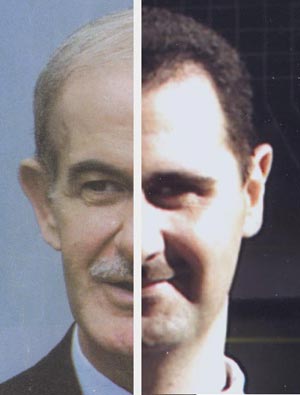 Syria’s President Bashar Assad tends to work from the same template as his father when it comes to Lebanon. In 1985-86, Hafez Assad engineered a return of Syrian soldiers to western Beirut, from where they had been compelled to withdraw by the Israelis in 1982. Assad managed this by allowing pro-Syrian militias in that part of the city, principally Jumblatt’s Progressive Socialist Party and Berri’s Amal movement, to go at each other with vicious abandon. Western Beirut effectively reverted to a state of nature, until the Sunni elite asked Assad for help. He was glad to oblige, and in 1985 he deployed intelligence agents in the capital, and a year later his army returned.
Syria’s President Bashar Assad tends to work from the same template as his father when it comes to Lebanon. In 1985-86, Hafez Assad engineered a return of Syrian soldiers to western Beirut, from where they had been compelled to withdraw by the Israelis in 1982. Assad managed this by allowing pro-Syrian militias in that part of the city, principally Jumblatt’s Progressive Socialist Party and Berri’s Amal movement, to go at each other with vicious abandon. Western Beirut effectively reverted to a state of nature, until the Sunni elite asked Assad for help. He was glad to oblige, and in 1985 he deployed intelligence agents in the capital, and a year later his army returned.
It was lost on no one what Wi’am Wahhab announced after the Burj Abi Haidar incident. 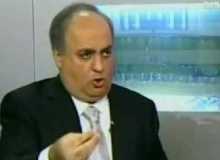 Wahhab’s sole reason for existing, evidently, is to issue statements clarifying the Syrian mindset, or at least that of the intelligence agencies, and he warned that Syria would intervene using all possible means to prevent a Sunni-Shiite conflict in Lebanon. Not surprisingly, Berri and Jumblatt simultaneously played up the sectarian nature of the Burj Abi Haidar incident, at a moment when Hizbullah was busily trying to portray it as a personal quarrel.
Wahhab’s sole reason for existing, evidently, is to issue statements clarifying the Syrian mindset, or at least that of the intelligence agencies, and he warned that Syria would intervene using all possible means to prevent a Sunni-Shiite conflict in Lebanon. Not surprisingly, Berri and Jumblatt simultaneously played up the sectarian nature of the Burj Abi Haidar incident, at a moment when Hizbullah was busily trying to portray it as a personal quarrel.
It would be too simplistic to suggest that the Syrians provoked the Hizbullah-Ahbash confrontation in order to bring their army back to Lebanon. Bashar Assad would like to do so, because only a military presence allows him to truly control the country and regain the Lebanese card regionally. However, such a process requires time, careful preparation regionally and internationally, and patience. For now the Syrians are focusing on gaining leverage against Hizbullah, which holds the political and military initiative in the country.
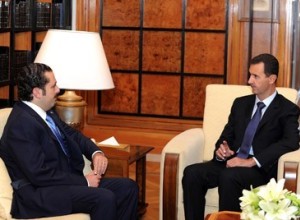 It appears that Saad Hariri, who hoped to use the outrage over Burj Abi Haidar to demilitarize the capital, was forced to backtrack by Syria. In a meeting with Assad earlier this week, the prime minister apparently heard from the Syrian president that it was important to maintain calm in Lebanon, but also to preserve the resistance. Consequently, the demilitarization proposal was placed on the backburner at a meeting on Tuesday of the Higher Defense Council. Instead, the council discussed reinforcing the Lebanese Army, whose performance last week was disparaged by neighborhood residents.
It appears that Saad Hariri, who hoped to use the outrage over Burj Abi Haidar to demilitarize the capital, was forced to backtrack by Syria. In a meeting with Assad earlier this week, the prime minister apparently heard from the Syrian president that it was important to maintain calm in Lebanon, but also to preserve the resistance. Consequently, the demilitarization proposal was placed on the backburner at a meeting on Tuesday of the Higher Defense Council. Instead, the council discussed reinforcing the Lebanese Army, whose performance last week was disparaged by neighborhood residents.
It is interesting that Hariri should have raised the issue of demilitarizing the capital. The prime minister is still awaiting a decision from the prosecutor of the special tribunal, in the hope that this will allow him to extract concessions from Hizbullah. So too are the Syrians. But it’s by no means certain that Hariri and Assad see eye to eye on what to demand. Demilitarization of the capital is Hariri’s indirect way of indicating that he will support Hizbullah as a resistance force in south Lebanon, but not the party’s takeover of the rest of the country. The Syrians probably agree with this, because ultimately their objective is to use Hizbullah in the south, too, while they themselves take over the rest of the country. However, by making Hariri play down his demilitarization demand, Assad was plainly suggesting that Syria alone is entitled to raise that matter.
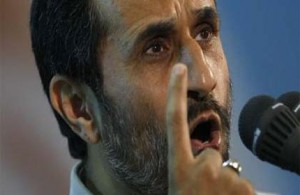 The maneuvering continues between Syria and Hizbullah, with Iran watching from the wings. Iranian President Mahmoud Ahmadinejad is supposed to visit Beirut in the foreseeable future. Will that trip go ahead as planned? The answer will tell us a great deal about the depth of the dissonance between Damascus and Tehran over Lebanon.
The maneuvering continues between Syria and Hizbullah, with Iran watching from the wings. Iranian President Mahmoud Ahmadinejad is supposed to visit Beirut in the foreseeable future. Will that trip go ahead as planned? The answer will tell us a great deal about the depth of the dissonance between Damascus and Tehran over Lebanon.
Michael Young is opinion editor of THE DAILY STAR and author of “The Ghosts of Martyrs Square: An Eyewitness Account of Lebanon’s Life Struggle” (Simon & Schuster).
Leave a Reply
You must be logged in to post a comment.